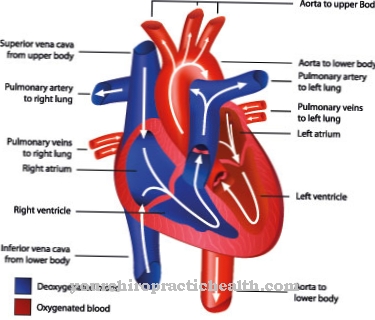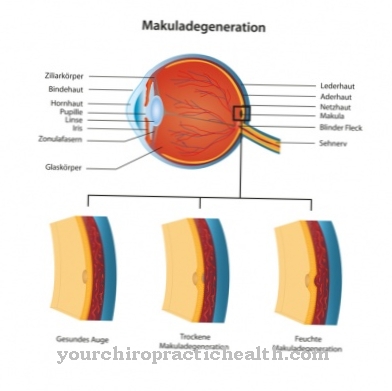European sleeping sickness is called an inflammation in the brain, which can cause sudden, severe disturbance of consciousness and neurological breakdown. Affected people fall uncontrollably into a deep sleep and are often not responsive afterwards. Many are in a complete freeze, both physically and mentally. Headache, nausea and fever often follow. The disease occurred more frequently in Europe between 1915 and 1927 and even led to deaths during this time. Later, only very rare outbreaks were recorded.
What is European sleeping sickness?

© JackF - stock.adobe.com
The disease was discovered and first described in 1916 by the Austrian psychiatrist and neurologist Constantin Freiherr Economo von San Serff (1876-1931). It was named after him Economo's disease. The name is better known Lethargic encephalitis. Sufferers were often surprised by sleep in the most uncomfortable postures, for example while eating or in the middle of work.
Some were easily awakened, but others died quickly. Economo noted frequent paralysis of the eye muscles and came across case reports from previous centuries that were located on the European continent.
The famous British neurologist Oliver Sacks (1933-2015) left impressive accounts of the fate of patients suffering from European sleeping sickness. At the end of the 1960s, as a young doctor in the neurology department of a hospital in the USA, he met some victims of European sleeping sickness, specifically the epidemic of the 1920s.
With a special nerve drug, he was able to restore consciousness to several patients within a short time. Some of them had awakened from their numbness again after years of mental stagnation. Because they could not cope with this completely new personal situation, they fell back into a general rigidity or developed other mental illnesses.
causes
Most of the time, encephalitis is caused by viruses. Bacteria or other pathogens are rarely the cause of encephalitis. Children, young adults and patients with compromised immune systems are particularly at risk. The viruses (for example herpes simplex viruses, varicella zoster virus, Epstein-Barr virus) either lead to inflammation directly in the brain or block the body's own immune system. Possible pathogens are also protozoa, parasites and fungi.
You can find your medication here
➔ Medicines against impaired consciousness and memory problemsSymptoms, ailments & signs
A sudden high fever, nausea, unusually severe headache and initially slight deterioration of consciousness can indicate encephalitis. Concentration and memory suddenly show deficiencies.
There are significant changes in behavior, including mood swings and disorientation. Language and speaking can be easily disturbed. If left untreated, the disease very often leads to death. If it is recognized early and properly treated, the chances of recovery are very good.
Permanent damage to the nervous system rarely occurs. However, this can only occur many years later. In the clinic, therefore, the neurological department is always responsible for encephalitis. Treated with medication, around 80 percent of patients recover. Persistent seizures and swelling of the brain pose a life-threatening risk.
Diagnosis & course
The doctor's diagnosis of suspected European sleeping sickness is extremely diverse. He needs information about general complaints, previous medical history and possible viral infections. He will also listen to descriptions from relatives or companions because the encephalitis patient often has noticeable problems with the ability to perceive and communicate.
Information about recent trips and any contact with people at risk, such as those with encephalitis, is also important. With physical and neurological examinations, the doctor then primarily tests the patient's chest and head area, his reflexes and reactions to stimuli.
He can recognize and interpret irregularities of the skin as well as impairments of the water balance. If encephalitis or especially encephalitis lethargica is suspected, the doctor will thoroughly examine the blood and cerebral fluids in order to find out the type and danger of the pathogen and any signs of inflammation.
Reliable knowledge about this can often only be gained after a few weeks. In order to rule out other possible brain diseases, the doctor can also use the evaluation of computed tomography, magnetic resonance tomography and electroencephalography.
Complications
European sleeping sickness is caused by encephalitis. This is now relatively rare, but can cause complications due to the severity of the disease. Encephalitis lethargica or Encephalitis Vienna can lead to Parkinson's-like symptoms or to conditions that resemble a vegetative state.
Neurological disorders that appear years later can be seen as a further complication of this disease. The American neurologist Oliver Sacks was able to temporarily remedy such symptoms with the administration of L-Dopa. For some of the resuscitated patients, this led to tragic complications. After years of dawning, they could not bear the new state of wakefulness.
As a result, they became depressed or mentally ill. The prognosis for such complications of European sleeping sickness is usually poor. The problem is that European sleeping sickness cannot be traced back to a specific pathogen. Due to initially unspecific complaints, the risks of complications occurring later are relatively high.
For example, a persistent seizure (status epilepticus) can occur. In other cases, swelling in the brain causes cerebral edema. Both complications of European sleeping sickness can be life-threatening for those affected. As the pathogen causing European sleeping sickness cannot yet be identified, complications can hardly be ruled out. Parkinson's syndrome can occur as a result of European sleeping sickness.
When should you go to the doctor?
If you suddenly experience a high fever, unusually intense headache, and other signs of encephalitis, an emergency doctor should be called. Mood swings and changes in behavior are further warning signs that are best clarified immediately. If you lose consciousness, the emergency services must be alerted immediately.
Until professional help arrives, it is advisable to check your pulse and heartbeat regularly. In addition, the person concerned must be brought into the stable side position so that he does not suffocate. He then usually has to spend some time in the hospital.
Whether further visits to the doctor are necessary depends very much on how European sleeping sickness progresses. In the event of pain, seizures or other complaints, you should definitely speak to the responsible doctor. Children, the elderly and patients with compromised immune systems are particularly likely to develop encephalitis. A targeted examination for encephalitis is recommended for these risk groups after a virus infection. The earlier the disease is recognized, the better the chances of recovery are usually.
Doctors & therapists in your area
Treatment & Therapy
The treatment of encephalitis is generally carried out in an inpatient clinic, because possibly life-threatening exacerbations in the course of the disease can be recognized and compensated for immediately. The administration of medication is also fully traceable and can be modified depending on the type of pathogen and the severity of the disease.
In the early stages of encephalitis, certain drugs may be ineffective as long as there is no definite clarity about the cause of the disease. They will then be immediately replaced by more appropriate means in the hospital. The use of medication for lowering fever, against brain changes, pain and possible seizures is also precisely tailored to the needs of the patient in the clinic.
Outlook & forecast
With European sleeping sickness, which only occurs occasionally today, irreversible damage occurs in the neuron network of the brain, which makes it impossible to cure the disease. The sleep attacks are temporary at first, but the disease still progresses and damages the neural network more and more.
In an acute state, the affected patients suddenly fall asleep and often maintain uncomfortable postures. Sleep is so deep that it often resembles a coma-like state. At the time of the greatest spread of the disease between 1915 and 1927, it was found that around a third of those affected died. Death often occurs very quickly, and the sick can always be woken up.
Surviving patients later suffer from paralysis of the eye muscles and eyelid paralysis. Many years after the sleep attacks, neurological problems appear, which in turn lead to the same symptoms as in the initial stage and then end in complete mental derangement of the patient. Those affected seem forgotten and lapse into complete rigidity.
The neurologist Oliver Sacks achieved success with an experimental L-Dopa therapy. L-Dopa has a stimulating effect and can bring the patient out of the freezing state. However, this awakening from complete spiritual paralysis is often only temporary. Some patients fall back into mental numbness because they cannot cope with the new situation after awakening.
You can find your medication here
➔ Medicines against impaired consciousness and memory problemsprevention
To prevent the brain disease encephalitis, vaccinations are recommended, which can help against a wide variety of pathogens. Since they fight similar strains of pathogens, vaccinations against measles, mumps, rubella and polio are also appropriate for increased resistance to Economo disease. There are also various special vaccinations available for people with an increased risk of neurological disease.
In this regard, special attention should be paid to the administration of serum against early summer meningoencephalitis (TBE), which is transmitted by ticks. TBE is a brain inflammation whose viral pathogens are very active. There are also some risk areas for this disease, which mainly occurs in spring and summer, in Germany. Travelers to Southeast Asia are also advised to have a preventive vaccination against so-called Japanese encephalitis, which is widespread there.
Aftercare
In most cases, those affected with this disease do not have any follow-up measures available. The disease itself must first and foremost be examined and treated directly by a doctor so that there are no further complications that could make everyday life difficult for the person affected. The affected person should consult a doctor at the first signs of this disease so that it can be treated quickly.
If the disease is left untreated, it can lead to serious complications that significantly reduce the person's quality of life. In most cases, patients with this disease are dependent on treatment by a psychologist. The treatment should be carried out regularly in order to properly relieve the symptoms.
The person concerned should avoid stress in any case, as this definitely promotes the disease. Various relaxation techniques can limit the disease and make life easier for the patient. Contact with other patients with the same illness can also be useful, as this leads to an exchange of information. Typically, this disease does not reduce life expectancy.
You can do that yourself
Since encephalitis can always be life-threatening, one of the most important self-help measures is to correctly interpret the symptoms and to consult a doctor promptly. In addition to fever and nausea, the first signs are very severe headaches as well as changes in behavior that manifest themselves in particular in the form of mood swings and disorientation. Such symptoms should by no means be played down as a side effect of the onset of the flu, but must be discussed with a doctor immediately.
Children and adolescents and patients with a weak immune system are particularly at risk. The immune system can be positively influenced by lifestyle. A healthy diet rich in vitamins and fiber, predominantly plant-based, as well as regular exercise in the fresh air strengthen the body's defenses. Unhealthy foods, especially fatty meat, sausage, sugar and white flour products as well as excessive consumption of alcohol and cigarettes should be avoided as far as possible.
People with an increased risk of neurological disease should really take advantage of the special vaccinations that are offered for them. In addition, vaccinations against certain childhood diseases such as measles, mumps and rubella can reduce the risk of developing European sleeping sickness.

.jpg)

.jpg)

.jpg)
.jpg)




















